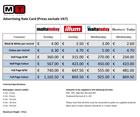
In BWSC’s own words: Our plant is a bad deal for Malta Government is spending thousands of euros out of the money we are paying for high water and electricity bills to buy advertising space in the local media, in an attempt to justify its decision to choose the plant offered by the Danish company BWSC for the extension of the Delimara Power Station. Even BWSC knows that this is not the best deal for Malta. So much so that technical documents prepared by BWSC show what a bad decision government has taken in selecting the BWSC plant, which consists of eight Warstila 18V46 medium speed diesel engines operating on heavy fuel oil.Nearly five years ago, on Monday May 23, 2005 at 12.27pm, Anders Langhorn sent an email to Joseph Mizzi and Martin Kok Jensen. Mizzi eventually became BWSC’s exclusive local agent. Twelve days earlier, onthe morning of 11 May 2005, Mizzi had contacted Anders Langhorn, to inform him that “we need to tap another source higher up in the political hierarchy…” and asked him to prepare a technical brief to convince Enemalta what power generating plant to go for. Mizzi told BWSC that he, with his excellent access to people high up in politics and at Enemalta, would secure them the contract. The email is called ‘Considerations Regarding 2st-4st.doc’. The email says: “Dear Joseph, with reference to low speed vs. medium speed units for larger power plants, kindly find attached our considerations in that regard. We have made it on plain paper without letter head as we assume it is intended for hand outs to third persons. In case you have comments or questions to the attached, please do not hesitate to contact us again. Best regards, Anders Langhorn.” In his three page document “for a source higher up in the political hierarchy”, Langhorn says that: “In the evaluation of the total generation cost throughout the lifetime of the plant, it is important to consider the expected economical lifetime of the plant. In estimating the economical lifetime, it is the normal practice among utility companies to assume an economic lifetime for low speed units at least five years longer than for medium speed units.” Not only do these plants have a short lifespan, they also develop serious maintenance problems after only 15 years. Langhorn’s report says that medium speed engines suffer “significant increase of major breakdowns after 15 years.” Langhorn also quotes from a big insurance company called ‘Swedish Club’ that refers to the unreliability of these engines and their high maintenance costs: “Medium speed engines are over-represented in the claims files” and “the average claims cost per year is five times as high for a medium speed engine than for a low speed engine.” Langhorn’s technical report on the weaknesses of the medium speed engines also states that their rate of degradation is approximately 1% a year, which is considered higher than others and their efficiency is 48%, lower than others. Their reliability is low, considering that they have 2% to 4% unscheduled outage, which means that their use results in more power failures and cuts than others. Their availability is only 7,600 to 8,100 hours a year, which is shorter than that of other plants. Their technical design leads to more stress on the engines and that is why they have frequent major breakdowns after 15 years. And their spare parts consumption is considered at least $4 per megawatt per hour, which is double than that for other plants. Despite all these weaknesses – unreliable, more expensive to maintain and a shorter life span – government has chosen these medium speed diesel engines for the new extension of Delimara Power Station.” It is very significant that in the tender evaluation formulas applied by Enemalta to award the tender to BWSC none of the weaknesses highlighted by BWSC about the medium speed diesel engines are taken into consideration. On the contrary, government and Enemalta went ahead to award the contract to BWSC with a plant that BWSC itself knows is not the best choice for Malta. In the early afternoon of Monday, 30 November 2009, together with Opposition Leader Dr Joseph Muscat, I met BWSC top officials Soren Barkholt and Martin Kok Jensen. At one point I showed them a copy of Andres Langhorn’s email and three-page document saying that medium speed diesel engines are bad for Malta and asked them to explain why they decided to send the technical document “on plain paper without letter head as we assume it is intended for hand outs to third persons.” In Joseph Mizzi’s words these third parties were influential people at Enemalta and a “source higher up in the political hierarchy”. Soren Barkholt and Martin Kok Jensen were embarrassingly silent and then muttered something to the effect that “they were not aware” of those documents! Anders Langhorn’s email and document had been copied to Martin Kok Jensen and he sat there in Parliament facing us and telling us that he was not even aware of it! It is pathetic and scandalous that government is now spending thousands of euros of our money to buy advertising space in the local media to say that BWSC’s medium speed diesel engines operating on heavy fuel oil are the best deal for Malta when in fact in BWSC’s own words they are a bad deal: unreliable, more expensive to maintain and with a short life span. Any comments? |
MT Surveys We asked.... Do you know what Vision 2015 is? 89% said ‘no’ Labour leads, but Gonzi makes slight recovery Survey confirms unpopularity of commuting Who’s the most trusted nanny in Gonzi’s cabinet? Consumers fishing around for better deals Robert Arrigo ‘most wanted’ for minister Cabinet thrives, but Fenech and Gatt hit rock bottom Bleak times – depression at the Grand Harbour Budget 2010 – Raise taxes or cut benefits? Only 35% will be taking a holiday this summer Corned beef? a matter of class Labour poised for absolute majority |
Managing editor Saviour Balzan | Tel. ++356 21382741 | Fax: ++356 21385075 | Email





